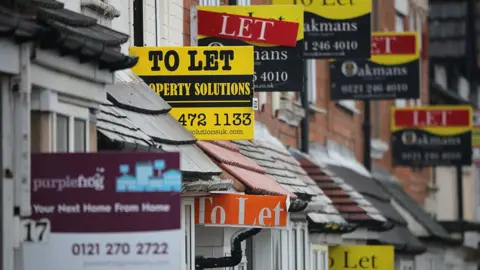'I earn £50,000 and can't afford to buy a house'
 Emma Harris
Emma HarrisOnly one in eight renters can afford to buy in the area in which they live, research suggests.
High rent, bills and house prices mean it is more difficult for renters to buy their first home than it is for existing owners to move on, according to Skipton Group.
Its new index, compiled by Oxford Economics, claims renters are four times less likely to be able to buy than homeowners.
Software engineer Emma Harris earns £50,000 a year and said the cost of renting and bills takes up about two-thirds of her salary. "I am not likely to ever own a house and it’s just depressing," she said.
She lives in Birmingham, and last year the average price of a first-time buyer home in the West Midlands was £215,000.
Ms Harris said: "I feel completely trapped in the situation I am in. The chances of me owning my own house are pretty much non-existent.
"I want to cry. I want to scream. I want to shout, and do various other things but none of them solve the issue - that I don't have the money to put away each month to scrape together the money for a deposit."
She said the prospect of raising money for a deposit caused "a few sleepless nights".
 Getty Images
Getty ImagesMs Harris said she was unsure that the new government's plan to build more homes would ease the situation.
She wanted mortgage lenders to take account of her regular payment of rent when assessing her ability to make repayments.
Regional disparities
The estimates come from analysis of data from the Skipton Group, the Bank of England and the Office for National Statistics. It measured people’s financial ability to buy and then run a home in England, Wales and Scotland.
They took into account the average-priced first-time buyer home in different areas.
The figures suggested it was easiest for first-time buyers to get a property in Scotland where house prices were lower, and the East of England because of higher wages.
It was hardest for those in the West Midlands and Wales owing to a combination of low savings and moderate property prices, and London because of high house prices.
High rent and energy prices have made saving for a deposit increasingly difficult for tenants whatever their income. For potential first-time buyer households in the bottom 25% of earners (those earning less than £22,850 a year), less than 1% could get on to the property ladder in their area, the report said.
Among renters in the top 25% of earners, with an income of more than £71,250 a year, only 44% could afford to buy a first home.
"For some, our findings paint a bleak picture, notably for first-time buyers," said Skipton chief executive Stuart Haire.
Separate estimates from First Direct, part of HSBC, said that a third of private-sector tenants who had recently experienced a rent increase were too financially squeezed to be able to put anything away in savings.

Ways to make your mortgage more affordable
- Make overpayments. If you still have some time on a low fixed-rate deal, you might be able to pay more now to save later.
- Move to an interest-only mortgage. It can keep your monthly payments affordable although you won't be paying off the debt accrued when purchasing your house.
- Extend the life of your mortgage. The typical mortgage term is 25 years, but 30 and even 40-year terms are now available.
